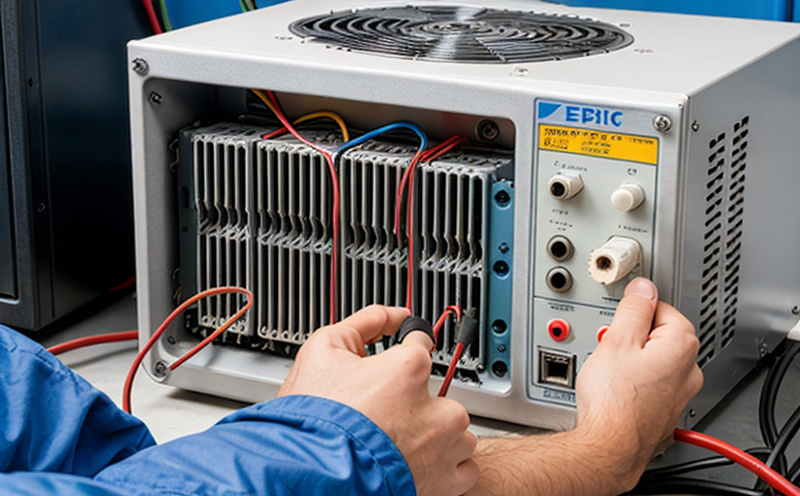IEC 63193 Fuel Cell Power System Testing for Marine Applications
The International Electrotechnical Commission (IEC) standard IEC 63193 provides a framework for the testing of fuel cell power systems designed specifically for marine applications. This standard ensures that these systems meet stringent performance, safety, and reliability requirements, which are critical in ensuring safe and efficient operation at sea.
The testing regimen outlined by this standard includes several key aspects aimed at validating the functional integrity of fuel cells under simulated operational conditions. The tests focus on measuring parameters such as power output, efficiency, durability, and environmental adaptability. These criteria ensure that the fuel cell systems can perform reliably in marine environments, which are characterized by fluctuating temperatures, humidity levels, and mechanical stress.
Testing methodologies include both laboratory-based evaluations and field trials to simulate real-world conditions accurately. Specimen preparation involves replicating actual components used in marine applications, such as fuel cells integrated into shipboard power systems. The apparatus required for these tests includes advanced instrumentation capable of measuring minute changes in performance metrics.
The acceptance criteria under IEC 63193 are rigorous and designed to ensure that only high-quality systems pass muster. Compliance with this standard is crucial for manufacturers looking to gain international recognition, as it demonstrates adherence to the highest industry standards.
Testing typically involves multiple stages, starting with initial performance checks followed by endurance tests to assess long-term reliability. Environmental stress testing ensures that the fuel cell can withstand harsh marine conditions, while interoperability tests verify seamless integration into existing shipboard systems. The comprehensive nature of this testing ensures that only robust and reliable products are approved for use in maritime applications.
In summary, IEC 63193 is pivotal for ensuring that fuel cell power systems meet the stringent requirements necessary for safe and efficient operation in marine environments. This standard provides a robust framework for evaluating performance, safety, and reliability, making it an essential tool for manufacturers seeking to establish credibility and compliance.
Scope and Methodology
The scope of IEC 63193 encompasses the testing of fuel cell power systems specifically designed for marine applications. The methodology involves a series of tests aimed at evaluating various critical parameters to ensure compliance with international standards.
- Performance testing: This evaluates the efficiency and output power of the fuel cells under simulated operational conditions.
- Durability testing: This assesses the long-term reliability of the systems by subjecting them to extended periods of operation.
- Environmental stress testing: This ensures that the fuel cell can withstand the harsh marine environment, including temperature and humidity variations.
- Interoperability testing: This verifies that the fuel cells integrate seamlessly with existing shipboard power systems.
The tests are conducted using advanced instrumentation capable of providing precise measurements. The apparatus required includes not only the fuel cell systems themselves but also support equipment to simulate real-world conditions accurately. Specimen preparation involves replicating actual components used in marine applications, ensuring that the testing reflects realistic operational scenarios.
Compliance with IEC 63193 is critical for manufacturers looking to enter international markets. The standard ensures that only high-quality systems pass muster, providing a strong foundation for establishing credibility and compliance.
Benefits
Compliance with IEC 63193 offers numerous benefits to manufacturers of fuel cell power systems for marine applications. Firstly, it ensures that the products meet stringent performance, safety, and reliability standards, which are critical in ensuring safe and efficient operation at sea.
Secondly, compliance facilitates international recognition, allowing companies to gain credibility in global markets. This is particularly important as more countries implement regulations requiring the use of environmentally friendly power sources in maritime applications.
Thirdly, meeting these standards can lead to cost savings through reduced warranty claims and maintenance costs. By ensuring that systems are robust and reliable from the outset, manufacturers can minimize downtime and associated expenses.
Fuel cell systems tested against IEC 63193 are also more likely to be accepted by regulatory bodies worldwide, streamlining compliance processes for future projects. This is especially advantageous for companies looking to expand their operations into new markets or regions with stringent environmental regulations.
Finally, adherence to these standards can enhance brand reputation and customer trust, as it demonstrates a commitment to quality and safety. This can be particularly beneficial in building long-term relationships with clients and partners in the maritime industry.
International Acceptance and Recognition
The international acceptance of products that comply with IEC 63193 is significant. This standard ensures that fuel cell power systems meet the stringent requirements necessary for safe and efficient operation in marine environments, which are characterized by fluctuating temperatures, humidity levels, and mechanical stress.
- Regulatory bodies worldwide recognize compliance with this standard as a mark of quality and reliability.
- Countries implementing regulations requiring the use of environmentally friendly power sources in maritime applications often accept products that meet IEC 63193 standards.
- The standard provides a robust framework for evaluating performance, safety, and reliability, which are critical factors in establishing credibility and compliance.
Meeting these standards is particularly advantageous for companies looking to expand their operations into new markets or regions with stringent environmental regulations. The international recognition provided by IEC 63193 can streamline compliance processes and enhance brand reputation, making it an essential tool for manufacturers seeking to establish credibility and compliance.





